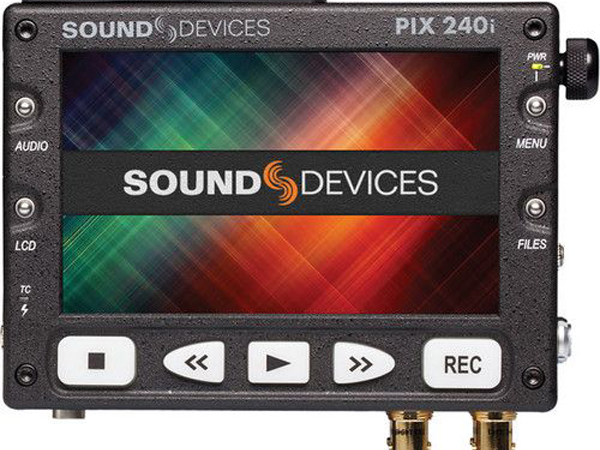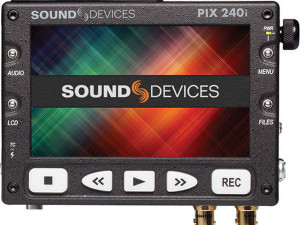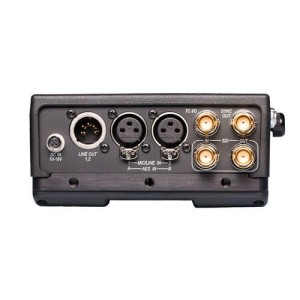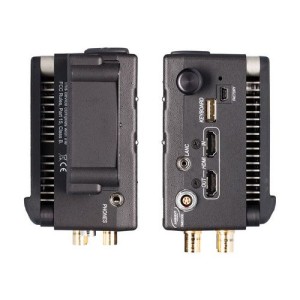
- 4:4:4, 12-bit recording
- 5″ IPS, glossy, 800 x 480 pixel LCD display
- Apple ProRes or Avid DNxHD codec at multiple data rates
- QuickTime file type
- 12-bit input and output video resolution
- Monitoring functions including False Color, Zebra Stripes, 1:1 Pixel Mapping, Peaking Filter
- Built-in hardware based frame rate converter and de-interlacer
- Up/Down/Cross Conversion of 480i, 525i, 720p, 1080i, 1080p
- Aspect ratio conversion
- 3:2 Pulldown Removal
- High-accuracy built-in timecode generator, with genlock and word clock output
- Ultra low-noise (-128 dBu) mic preamps with phantom, limiters, line input
- Ability to defeat audio output delay while maintaining audio/ video sync on recorded file
- CompactFlash or 2.5″ SSD file storage with media spanning, UDF format for Mac OS and Windows
- Large, illuminated, tactile buttons for fast and simple menu control
- Simultaneous HDMI and HD-SDI output
- 336-core, 32-bit massively parallel processor with 1.2 TeraOps for efficient video encoding
- 10-18 VDC and dual L-series battery powering
- Metalized, molded carbon fiber chassis
- IPS Field Monitor
The PIX 240i features a glossy, 5″ display with IPS technology providing accurate color representation and ultra-wide off-axis visibility. Monitoring features such as 12-step false color and two-level zebra assist in framing, exposure evaluation, and focus evaluation. Details overlayed on the picture include audio metering, timecode, file type, record status, and frame rate information. The display also doubles as a simple to operate menu interface. Timecode and record state display can be sent to the SDI and HDMI outputs. - File-Based Recording
The PIX 240i records QuickTime files in either Apple ProRes or Avid DNxHD video formats. Files recorded in these intra-frame codecs are ready-for-editing directly from the recorder. For color-critical applications, recording to Apple ProRes 4444 provides uncompressed alpha-channel transparency for superb chroma keying and grading performance. - Extensive Video I/O
The SDI input accepts 12-bit 3G SDI (4:4:4 RGB or YCbCr), HD-SDI, and SD-SDI. The HDMI input accepts HD and SD video. Recording to ProRes 4444 via 3G-SDI 4:4:4 input provides recordings that are perceptually indistinguishable from the original source material. - Frame Rate Converter and Scaler
A hardware scaler and frame rate converter performs up, down, and cross-conversion and pulldown removal, providing the ability to record files in a customer-requested rate, even one not supported by the camera being used. The PIX 240i also supports HD to SD and SD to HD aspect ratio conversion. - Timecode Generator
An on-board high-accuracy Ambient timecode generator allows the PIX 240i to be used in single camera shoots and complex multi-camera sync-sound productions. All common timecode frame rates and modes are supported. Embedded timecode over SDI and HDMI is also supported. - Audio Performance
The PIX 240i features full-sized XLR audio inputs for microphone or line level signals. Microphone-level inputs offer 48V phantom power, input limiters, and sweepable high-pass filters. Inputs can also be set to accept up to four channels of AES3 digital audio. Inputs offer selectable audio delay. Since video cameras often introduce several frames of delay because of internal processing, audio signals connected directly to the PIX 240i can be delayed up to 500 ms to accommodate that delay and provide perfect synchronization between video and audio signals. - Playback
A wide range of playback features consists of off-speed, forward, backward, freeze-frame, looping, and custom playlists. File markers can be set while in record or playback mode with the press of a button and loop playback modes allow continuous looping playback of entire files or between files markers. Playlists allow quickly organizing multiple files for consecutive or loop playback. - File Storage and Transfer
Recording and playback is done in QuickTime files to either removable CompactFlash cards or removable 2.5″ SSDs approved by Sound Devices. These approved media are formatted by PIX recorders as UDF volumes that are directly mountable, readable, and writable in Mac OS and Windows. The 2.5″ SSDs mount to PIX-CADDY 2 drive caddies for a secure, hot-swappable, locking data connection. - Mechanical Construction
A durable chassis made of lightweight, molded, metalized-carbon-fiber is reliable for the rigors of field production. Four 1/4″-20 threads on two different axes offer countless mounting options. All major connections, including SDI and XLR, use full-sized, locking connectors. - Powering
The PIX 240i powers by removable Sony-compatible, L-series lithium-ion camcorder batteries or by an external 10-18 VDC adapter. Battery mounts are connected in parallel so batteries can be hot-swapped during operation, with no loss of power. When external power is removed while a battery is mounted, the recorder seamlessly transfers to battery power. Battery source and voltage is shown on the on-screen display. - Controls
The side panel rotary knob makes menu navigation fast and simple. Simple controls and a straightforward plain-language menu make setups easy for both new and experienced users. Four large, illuminated, tactile record, stop, play, rewind, and fast-forward controls are easy to access with gloved hands. Screen and button brightness are adjustable.
SDI Input & Output 4:4:4 or 4:2:2; 12, 10, or 8-bit
Input: 3G-SDI (levels A and B), HD-SDI, or SDI
Output: 3G-SDI (level A), HD-SDI, or SDI
SMPTE 12M-1, 12M-2, 125M, 259M, 272M, 291M, 292, 296M, 299, 352M, 372, 424, 425
HDMI Input & Output Input: v1.4a, 4:4:4 or 4:2:2, RGB or YCbCr, 10 or 8-bit, HDCP-enabled
Output: v1.3, 4:2:2 8-bit, RGB and YCbCr
Video Input Resolutions / Rates 1080p23.976/24/25/29.97/30
1080i50/59.94/60
1080PsF23.976/24/25/29.97/30
720p23.976/24/25/29.97/30 (SDI only)
720p50/59.94/60
576i50 (PAL)
480i59.94 (NTSC)
Video Codecs and Files Apple ProRes 4444, 330 Mb/s, 12-bit
Apple ProRes 36, 100, 145, 220 Mb/s, 8 and 10-bit
Avid DNxHD 36, 100, 145, 220 Mb/s, 8 and 10-bit
QuickTime wrapper (.MOV), UDF file system
Up/Down/Cross Conversion 480i, 576i, 720p, 1080i, 1080p to any 480i, 576i, 720p, 1080i, 1080p
Hardware based, 10-bit
Frame Rate Conversion 24, 25, 30, 50, 60 to 24, 25, 30, 50, 60, 23.976, 29.97, 59.94 to 23.976, 29.97, 59.94, automatic 3:2 pull-down removal in 23.976 and 24 frame modes, other pull-down cadences include 2:2:2:4, 2:3:3:2, 3:2:3:2:2, and 2:2
Hardware based, 10-bit
LCD Display 5" (12.7 cm), 800 x 480 pixel LCD display, glossy
IPS (In-Plane Switching) enables ultra wide viewing angle and color accuracy
Audio Recording 8 channels record/playback, simultaneous with video
Analog, HDMI or SDI, AES/EBU, selectable per channel
Analog Audio 2 balanced, mic- or line-level inputs on XLR (48 V phantom switchable)
2 balanced, line-level outputs on 5-pin XLR
Frequency Response: 10 Hz-20 kHz, +/- 0.5 dB re 1 kHz
THD + Noise: 0.004% max (1 kHz, 22 Hz-22 kHz)
Input and Output Topology: fully electronically balanced, line-level, RF, ESD, short, and overload protected; pin-2 hot, pin-3 cold
Line Output Clipping Level: +18dBu
Output Attenuation: 0-20 dB, 1 dB increments
Headphone, 1/8" with gain control
Digital Audio Sampling Rate / Bit Depth: 48 kHz, 24-bit
AES/EBU: 4 channels in via XLR, 110 ohm, 2 V p-p
Accepts 32k, 44.1k, 48k, 96k, 192k sample rates with SRC at input
HDMI: 2 channels embedded HDMI input, 8 channels embedded HDMI output
Accepts 32k, 44.1k, 48k, 96k, 192k sample rates
SDI: 8 channels embedded SDI input, 8 channels embedded SDI output, 48k sample rate
File Storage The following can be used as storage media:
Sound Devices approved 2.5-inch drive:
"PIX-CADDY 2" mounted drive
eSATAp-connected drive
Sound Devices approved CompactFlash card
(* eSATAp supplies 5 V @ 2A)
Timecode Modes supported: Freerun, Record run, External
Frame rates: 23.976, 24, 25, 29.97DF, 29.97ND, 30DF, 30ND
Accuracy: +/- 0.2ppm, holds accurate time code for 2 hours after power is removed
Inputs / Outputs: BNC (LTC input and output), SDI or HDMI (Sony protocol), LEMO 5-pin
Sync Output Analog bi-, tri-level sync / genlock
Wordclock (square wave, 48 kHz sampling rate, 3.3 vp-p, 75 ohm)
Sync Input Analog bi-, tri-level sync / genlock
Wordclock (square wave, 48 kHz sampling rate, 3.3 vp-p, 75 ohm)
Control Record triggering via SMPTE timecode
LANC or GPIO on 2.5 mm jack
Keyboard USB host; keyboards without hubs supported
Power 4-pin Hirose, 10-18 VDC, pin-1 (-) pin-4 (+)
Operating Temperature 14 to 104°F (-10 to 40°C)
Dimensions 5.5 x 4 x 2.4" (14 x 10.2 x 6.1 cm)
Weight 2 lb (0.91 kg)
Description
The Sound Devices PIX 240i 5" Portable Video Recorder & Monitor is an external video recorder and monitor featuring gold-plated 3G-SDI and HDMI video inputs and outputs. By SDI, you can record 1080p 4:4:4 color information in 12-bit color depth to Apple's ProRes 4444 codec, or 1080p 4:2:2 10 or 8-bit to ProRes or Avid's DNxHD, and by HDMI you can record 4:4:4 or 4:2:2 in 10 or 8-bit. For ProRes 4444, the transfer rate is 330Mbps and for the other codecs 220Mbps. All recordings get stored as QuickTime .MOV files to either CF cards or 2.5" Sound Devices-approved SSDs, such as the PIX-SSD5. A built-in scaler will let you perform up, down and cross conversion, pulldown removal, and HD-to-SD / HD-to-SD aspect ratio conversion.
The SDI input and output both support 8-channel, 48k embedded audio, and the HDMI input supports two channels and the output eight channels. For independent audio, the PIX 240i also has full-sized XLR audio inputs for microphone or line level signals. Microphone-level inputs offer 48V phantom power, input limiters, and sweepable high-pass filters. Inputs can also be set to accept up to four channels of AES3 digital audio.
The difference between the PIX 240i and the preceding PIX 240 is that the 240i is equipped with an IPS display which affords an ultra-wide viewing angle. The display measures 5" diagonally, is glossy, and has an 800 x 480 resolution. Monitoring functions include 12-step False Color, two-level Zebra, 1:1 Pixel Mapping, and Peaking. You can also overlay audio metering, timecode, file type, record status, and frame rate information.



